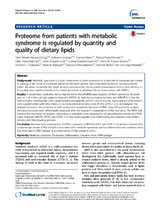Proteome from patients with metabolic syndrome is regulated by quantity and quality of dietary lipids
Autor
Rangel Zúñiga, Oriol Alberto
Camargo García, A.
Marín, Carmen
Peña Orihuela, Judhit
Pérez-Martínez, Pablo
Delgado-Lista, Javier
González Guardia, Lorena
Yubero-Serrano, Elena M.
Tinahones, Francisco J.
Malagón, María M.
Pérez-Jiménez, Francisco
Roche, Helen M.
López-Miranda, José
Editor
BioMed CentralFecha
2015Materia
Metabolic syndromeProteomics
Inflammation
Oxidative stress
DNA damage
METS:
Mostrar el registro METSPREMIS:
Mostrar el registro PREMISMetadatos
Mostrar el registro completo del ítemResumen
Background: Metabolic syndrome is a multi-component disorder associated to a high risk of cardiovascular disease.
Its etiology is the result of a complex interaction between genetic and environmental factors, including dietary
habits. We aimed to identify the target proteins modulated by the long-term consumption of four diets differing in
the quality and quantity of lipids in the whole proteome of peripheral blood mononuclear cells (PBMC).
Results: A randomized, controlled trial conducted within the LIPGENE study assigned 24 MetS patients for 12 weeks
each to 1 of 4 diets: a) high-saturated fatty acid (HSFA), b) high-monounsaturated fatty acid (HMUFA), c) low-fat,
high-complex carbohydrate diets supplemented with placebo (LFHCC) and d) low-fat, high-complex carbohydrate
diets supplemented with long chain (LC) n-3 polyunsaturated fatty acids (PUFA) (LFHCC n-3). We analyzed the
changes induced in the proteome of both nuclear and cytoplasmic fractions of PBMC using 2-D proteomic analysis.
Sixty-seven proteins were differentially expressed after the long-term consumption of the four diets. The HSFA diet
induced the expression of proteins responding to oxidative stress, degradation of ubiquitinated proteins and DNA
repair. However, HMUFA, LFHCC and LFHCC n-3 diets down-regulated pro-inflammatory and oxidative stress-related
proteins and DNA repairing proteins.
Conclusion: The long-term consumption of HSFA, compared to HMUFA, LFHCC and LFHCC n-3, seems to increase the
cardiovascular disease (CVD) risk factors associated with metabolic syndrome, such as inflammation and oxidative stress,
and seem lead to DNA damage as a consequence of high oxidative stress.

